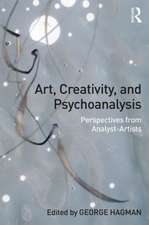Memento: Philosophers on Film
Editat de Andrew Kaniaen Limba Engleză Paperback – 18 mai 2009
This is the first book to explore and address the myriad philosophical questions raised by the film, concerning personal identity, free will, memory, knowledge, and action. It also explores problems in aesthetics raised by the film through its narrative structure, ontology, and genre. Beginning with a helpful introduction that places the film in context and maps out its complex structure, specially commissioned chapters examine the following topics:
- memory, emotion, and self-consciousness
- agency, free will, and responsibility
- personal identity
- narrative and popular cinema
- the film genre of neo-noir
- Memento and multimedia
Toate formatele și edițiile
| Toate formatele și edițiile | Preț | Express |
|---|---|---|
| Paperback (1) | 277.11 lei 6-8 săpt. | |
| Taylor & Francis – 18 mai 2009 | 277.11 lei 6-8 săpt. | |
| Hardback (1) | 711.92 lei 6-8 săpt. | |
| Taylor & Francis – 18 mai 2009 | 711.92 lei 6-8 săpt. |
Preț: 277.11 lei
Nou
Puncte Express: 416
Preț estimativ în valută:
53.03€ • 55.76$ • 43.81£
53.03€ • 55.76$ • 43.81£
Carte tipărită la comandă
Livrare economică 16-30 aprilie
Preluare comenzi: 021 569.72.76
Specificații
ISBN-13: 9780415774741
ISBN-10: 0415774748
Pagini: 208
Dimensiuni: 138 x 216 x 13 mm
Greutate: 0.27 kg
Ediția:1
Editura: Taylor & Francis
Colecția Routledge
Seria Philosophers on Film
Locul publicării:Oxford, United Kingdom
ISBN-10: 0415774748
Pagini: 208
Dimensiuni: 138 x 216 x 13 mm
Greutate: 0.27 kg
Ediția:1
Editura: Taylor & Francis
Colecția Routledge
Seria Philosophers on Film
Locul publicării:Oxford, United Kingdom
Public țintă
UndergraduateCuprins
Introduction Andrew Kania 1. Moral Monster or Responsible Person? Memento’s Leonard as a Case Study in Defective Agency Michael McKenna 2. Leonard’s System: Why Doesn’t It Work? Joseph Levine 3. The Feel of the World: Exograms, Habits, and the Confusion of Types of Memory John Sutton 4. The Value of Memory: Reflections on Memento Raymond Martin 5. Memento and Personal Identity: Do We Have it Backwards? Richard Hanley 6. Memento and the Phenomenology of Comprehending Motion Picture Narration Noël Carroll 7. Reconfiguring the Past: Memento and Neo-Noir Deborah Knight and George McKnight 8. What is Memento? Ontology and Interpretation in Mainstream Film Andrew Kania Index
Recenzii
‘A fascinating collection of essays, from a number of notable hands, on philosophical issues raised by one of the most mind-bending of recent films, Christopher Nolan's Memento. Anyone interested in what film might teach us about the nature of memory, self, knowledge, and narration will here find a rich source of reflections. The essays are admirably introduced by the editor, who also provides invaluable signposting to the structure and content of this most enigmatic of cinematic productions.' - Jerrold Levinson, University of Maryland, USA
‘Memento is a remarkable narrative achievement and this book of philosophical essays - more conventional in structure than the film I'm glad to say - brings into sharp relief the ideas on persons, their mental and moral resources, that inform the film. Kania has chosen his contributors well; here analytic philosophy, so often portrayed as insensitive to artistic and imaginative aspirations, is very light on its feet.' - Gregory Currie, University of Nottingham, UK
'A fascinating collection of essays, from a number of notable hands, on philosophical issues raised by one of the most mind-bending of recent films, Christopher Nolan's Memento. Anyone interested in what film might teach us about the nature of memory, self, knowledge, and narration will here find a rich source of reflections. The essays are admirably introduced by the editor, who also provides invaluable signposting to the structure and content of this most enigmatic of cinematic productions.' – Jerrold Levinson, University of Maryland, USA
'Memento is a remarkable narrative achievement and this book of philosophical essays - more conventional in structure than the film I'm glad to say - brings into sharp relief the ideas on persons, their mental and moral resources, that inform the film. Kania has chosen his contributors well; here analytic philosophy, so often portrayed as insensitive to artistic and imaginative aspirations, is very light on its feet.' – Gregory Currie, University of Nottingham, UK
'[These essays offer] . . .clear, accessible, and engaging introductions to basic philosophical questions and concepts in a way that enriches our understanding of Memento and philosophy both. . . The range of topics, the dialogue the essays themselves foster, and the genuine philosophical light shed by them will, as Hanley says, not only "get you thinking" but "keep you thinking." This collection is a good choice for undergraduate courses in philosophy and is accessible enough to be of interest to philosophically minded fans of Memento or film more generally.' – Metapsychology
‘Memento is a remarkable narrative achievement and this book of philosophical essays - more conventional in structure than the film I'm glad to say - brings into sharp relief the ideas on persons, their mental and moral resources, that inform the film. Kania has chosen his contributors well; here analytic philosophy, so often portrayed as insensitive to artistic and imaginative aspirations, is very light on its feet.' - Gregory Currie, University of Nottingham, UK
'A fascinating collection of essays, from a number of notable hands, on philosophical issues raised by one of the most mind-bending of recent films, Christopher Nolan's Memento. Anyone interested in what film might teach us about the nature of memory, self, knowledge, and narration will here find a rich source of reflections. The essays are admirably introduced by the editor, who also provides invaluable signposting to the structure and content of this most enigmatic of cinematic productions.' – Jerrold Levinson, University of Maryland, USA
'Memento is a remarkable narrative achievement and this book of philosophical essays - more conventional in structure than the film I'm glad to say - brings into sharp relief the ideas on persons, their mental and moral resources, that inform the film. Kania has chosen his contributors well; here analytic philosophy, so often portrayed as insensitive to artistic and imaginative aspirations, is very light on its feet.' – Gregory Currie, University of Nottingham, UK
'[These essays offer] . . .clear, accessible, and engaging introductions to basic philosophical questions and concepts in a way that enriches our understanding of Memento and philosophy both. . . The range of topics, the dialogue the essays themselves foster, and the genuine philosophical light shed by them will, as Hanley says, not only "get you thinking" but "keep you thinking." This collection is a good choice for undergraduate courses in philosophy and is accessible enough to be of interest to philosophically minded fans of Memento or film more generally.' – Metapsychology




















